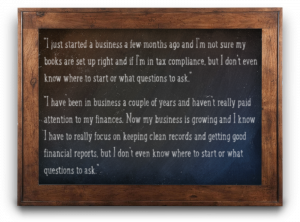Guest blogger, Debi Choi of Blue Ridge Business Services, walks us through the first steps of determining your business’s accounting and bookkeeping needs and how to determine the right questions to ask about your business and about whom you may be considering as an accountant or bookkeeper.

I have a response question: Would you try to overhaul your car’s transmission by yourself or perform surgery on yourself when your appendix needs to come out? Of course not! Unless you are a certified mechanic and using some diagnostic tools or a licensed surgeon who runs some tests first, you wouldn’t even be able to assess the need for these “fixes.” That is why a knowledgeable support person in this area is critical.
When I begin my assessments, I have several questions to ask first before doing anything. Here are a few of the biggest to answer.
Assessment Questions
- What type of entity are you? Each entity is treated somewhat differently in recordkeeping, and they have different IRS compliance rules and regulations which determine HOW you will file taxes and what forms you will need.
- Sole Proprietor—filed on a schedule C either jointly with spouse or on your individual return
- S Corp—Requires separate tax return and you receive a K-1 to file jointly with spouse or on individual return
- C Corp—Requires separate tax return and you receive a K-1 to file jointly with spouse or on individual return
- Partnership—Requires separate tax return and each partner will receive a K-1
- Do you have employees or 1099 contractors?
- This determines which software will be best suited to process your employees or vendors and the required governmental forms. A lot of banks will handle this for you at a minimal cost; just keep in mind that the payroll and taxes will still need to be recorded or imported into your accounting software so consider the time that might be involved in that.
- What recordkeeping system are you currently using?
- I most often hear QuickBooks but there are a couple of other really simple and automated systems a small business owner can use to reduce time and recordkeeping headaches. TIP: Just because your data is being imported from your bank, does not mean it doesn’t need to be reconciled to catch errors.
- When was the last time your bank accounts were reconciled?
- This should be done monthly and reviewed for any fraudulent activity.
The secondary goal is to be able to hand your CPA clean reports at year-end and not incur the additional hefty costs of your CPA trying to clean up your data or compile scattered information to prepare your taxes.
Choosing the right person to support your finances is critical. Just as choosing a mechanic who is not certified and experienced, or a surgeon who isn’t licensed, is dangerous and costly, so can it be when it comes to your bookkeeper or accountant.
In my next blog, I will focus solely on the assessment questions you need to ask the person you might consider hiring for this role so you don’t end up hiring the wrong person for the job. Meanwhile, stop by my website at brbs.us and take a look at the services I have to offer, or contact me by phone at (800) 505-6605 or email at debi@brbs.us so we can take a look at where you stand and how I can help support your financial growth!